Originally published September 30, 2022
What Historians Say About Calling Out What Is
Don Hudson Named Newsday’s First Black Top Editor
Homepage photo: African American men in Alabama vote for the first time since 1890 in the 1946 Democratic primary. (Credit: Bettmann/Bettmann Archive)
Journal-isms Roundtable photos by Sharon Farmer/sfphotoworks
[btnsx id=”5768″]
Fifty-seven were on the Zoom Sept. 26, with another 134 having watched on Facebook and YouTube as of midday Sept. 30.
What Historians Say About Calling Out What Is
Who says the United States is a democracy?
It certainly didn’t start out that way, say historians of color, citing the supremacy of white male property owners embedded in the Constitution.
Today’s metastasizing of those anti-democratic tendencies, from curtailment of voting rights to the Jan 6 insurrection, have deep roots.
What should journalists do about it, particularly if they are Black, Latino, Asian American or Native American?
That’s what was on the table Monday at this month’s Journal-isms Roundtable. The responses ranged from advocating for teaching more unsanitized U.S. history, not less, to calling it out in clear language when fascism infiltrates our politics.
Jon Funabiki, who retired last year as journalism professor at San Francisco State University and director of the Renaissance Journalism Project, there, introduced many to the word “anocracy” — defined as “neither fully democratic nor fully autocratic.”
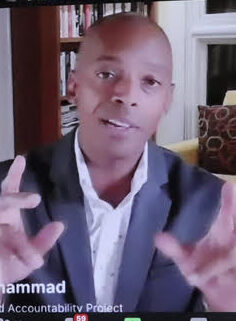 Historian Khalil Gibral Muhammad (pictured) and anthropologist Aimee M. Villarreal said Americans should consider that barely reported changes in the social fabric have included the expansion of “whiteness” to other groups who formerly would have been considered nonwhite, in the same way that southern and eastern Europeans eventually were considered on par with the Anglo-Saxon and Nordic earlier in U.S. history.
Historian Khalil Gibral Muhammad (pictured) and anthropologist Aimee M. Villarreal said Americans should consider that barely reported changes in the social fabric have included the expansion of “whiteness” to other groups who formerly would have been considered nonwhite, in the same way that southern and eastern Europeans eventually were considered on par with the Anglo-Saxon and Nordic earlier in U.S. history.
“Thanks for one of the most in-depth conversations I have attended on this key topic!” Phil Tajitsu Nash, lecturer in the Asian American Studies Program at the University of Maryland. messaged afterward. “I took 17 pages of notes, and have a lot of reading and follow-up to do.” Nash is board co-president of the Asian American Legal Defense and Education Fund.
Gregg Morris, who teaches journalism at Hunter College in New York, wrote on the Roundtable’s YouTube page, “An amazing and exhilarating get-together ZOOM round table of historians and journalists discussing, analyzing in an evening ZOOM unlike any you would see on the mainstream. Soooo many veterans who have been on the front lines that I lost track. Must see ..”
The September Journal-isms Roundtable took place on Monday, Sept. 26. The subject: “How do historians of color look at the state of U.S. democracy in 2022, and how should journalists frame their first rough draft of history?”
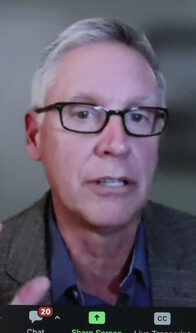 Panelists were Philip Deloria (pictured), the first specialist in Native American studies on the Harvard faculty and a member of the Traditional Territory of the Massachusett People; Stewart Kwoh, a co-founder and co-executive director of the Asian American Education Project and founder and president emeritus of Asian American Advancing Justice – LA; Muhammad, who is Ford Foundation Professor of History, Race and Public Policy at Harvard Kennedy School and former director of New York’s Schomburg Center for Research in Black Culture; and Villarreal of Texas State University, an anthropologist who does interdisciplinary research primarily focused on Mexican American and Native American communities.
Panelists were Philip Deloria (pictured), the first specialist in Native American studies on the Harvard faculty and a member of the Traditional Territory of the Massachusett People; Stewart Kwoh, a co-founder and co-executive director of the Asian American Education Project and founder and president emeritus of Asian American Advancing Justice – LA; Muhammad, who is Ford Foundation Professor of History, Race and Public Policy at Harvard Kennedy School and former director of New York’s Schomburg Center for Research in Black Culture; and Villarreal of Texas State University, an anthropologist who does interdisciplinary research primarily focused on Mexican American and Native American communities.
Ray Suarez, journalist and podcaster, formerly of the “PBS NewsHour” and author of “Latino Americans: The 500-Year Legacy That Shaped a Nation,” helped steer the conversation while stationed in Shanghai, China. Suarez is teaching at NYU Shanghai and navigated the 12-hour time difference. Fifty-seven were on the Zoom, with another 134 having watched on Facebook and YouTube as of midday Sept. 30.
You can see the YouTube video embedded at the top of this column or here.
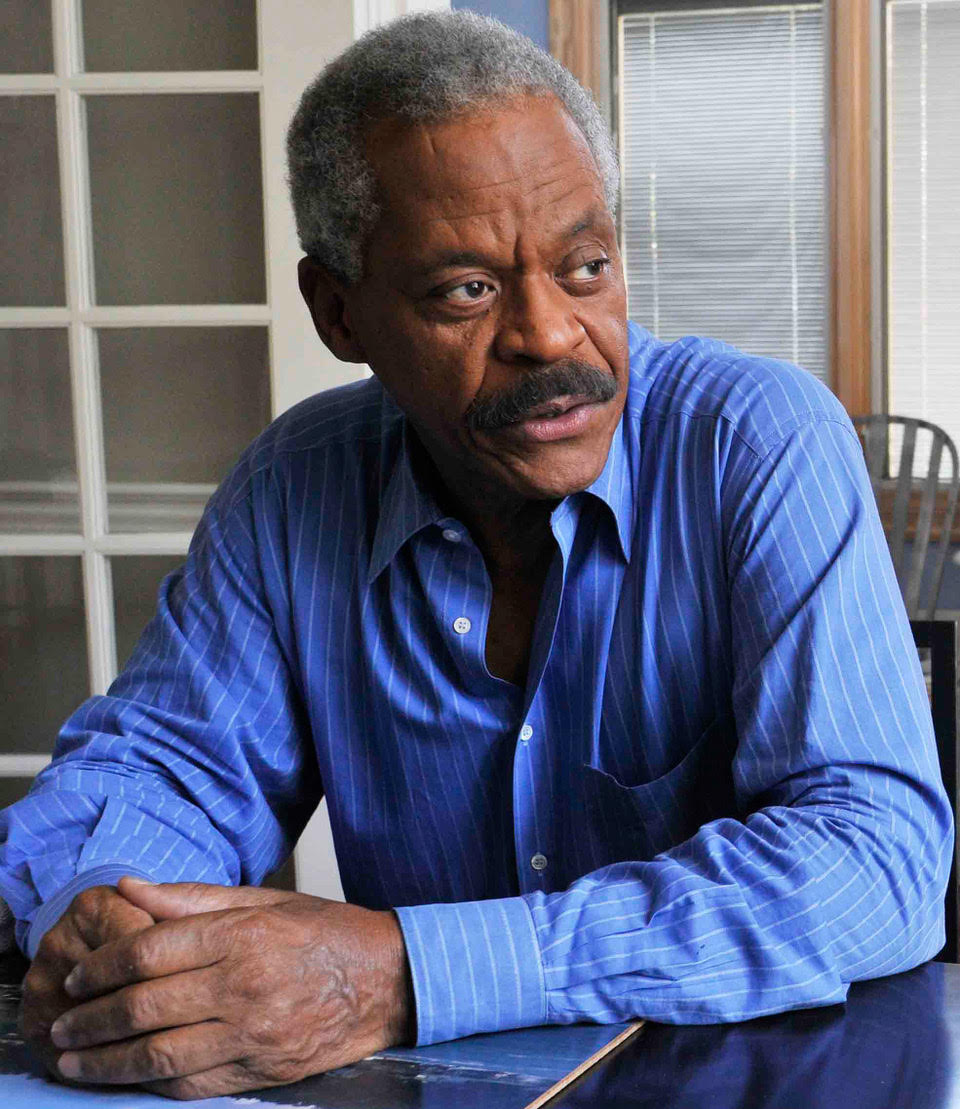 The group heard a riveting remembrance of pioneering journalist Bernard Shaw, CNN’s first chief anchor (pictured, by Jason Miccolo Johnson), who died at 82 on Sept. 8, from journalist friends Kenneth Walker, Clarence Page, Lynne Adrine and Eugene Robinson. We also toasted Ron Nixon, who on Sept. 14 was promoted to vice president for investigative, enterprise, grants and partnerships at the Associated Press.
The group heard a riveting remembrance of pioneering journalist Bernard Shaw, CNN’s first chief anchor (pictured, by Jason Miccolo Johnson), who died at 82 on Sept. 8, from journalist friends Kenneth Walker, Clarence Page, Lynne Adrine and Eugene Robinson. We also toasted Ron Nixon, who on Sept. 14 was promoted to vice president for investigative, enterprise, grants and partnerships at the Associated Press.
Nixon said AP would continue to collaborate with PBS’ “Frontline” and mentioned a planned AP film project about a failed attempt by U.S. Army veterans to organize an insurrection to topple Venezuelan President Nicolas Maduro.
Walker told the group, “I wonder sometimes whether the younger journalists today have not only the integrity, but the balls that Bernie had. Bernie was not ashamed to identify wrongdoing in the industry or in the companies he was in, and my sense of it is that’s become a lost talent or art.”
Asked what lessons Shaw’s life had for younger journalists, Roger Witherspoon, an early producer for Shaw at CNN, said, “That if you’re going to be one of the only, or few Black professionals in a place, you’re setting a standard for others to follow in making a way for others behind you, and Bernie was always cognizant of that.”
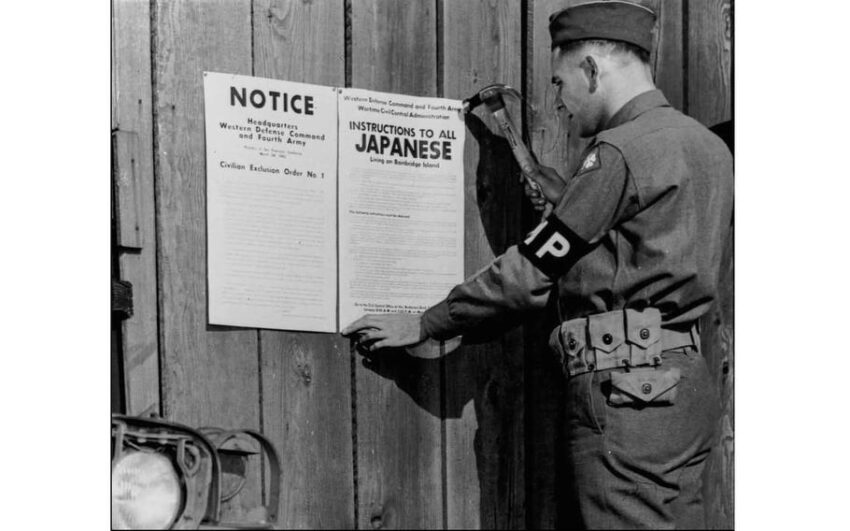
President Biden inspired this Roundtable topic after calling historians to the White House in August, and they told him that U.S. democracy is teetering
This led to a Sept. 1 presidential speech warning of the ongoing threat to democracy from MAGA Republicans.
However, all but one of those historians, Fareed Zakaria, was white.
Among the many journalistic responses was a front-page splash, “DEMOCRACY CHALLENGED: A Crisis Coming’: The Twin Threats to American Democracy” by David Leonhardt, posted Sept. 17 by The New York Times.
Leonhardt contended that the United States was never a perfect democracy, given, among other reasons, that the U.S. Senate awards small states with fewer people of color the same representation as larger states where those populations are concentrated. Moreover, states who have the choice to do otherwise give all their Electoral College votes to the statewide presidential winner, rather than award those votes proportionately. That’s how Donald Trump won the presidency in 2016 and George W. Bush was victorious in 2000 even though both lost the popular vote, he said.
There are more fundamental reasons why the United States is not a democracy, the Roundtable panelists said. And unlike many white historians, they tied the degree of democracy to the historical treatment of those who are not white and male.
“White democracy is built upon land expropriation, the removal and genocide of Native people,” as well as slavery, Villarreal said. “We have to remember too that the indigenous people have been enslaved. I’m originally from New Mexico, and we had a long history of Spanish enslavement,” she added.
Gary Fields, a member of the democracy team at the Associated Press, asked, if the 1965 Voting Rights Act was passed to ensure a fundamental right, “why is there a sunset?“
Native Americans were written out of the Constitution, Deloria noted, as the tribes wanted. As “domestic dependent nations” [PDF], they have nation-to-nation relationships with the federal government that are the subject of upcoming court cases.
Perhaps the most fascinating part of the discussion was what was called the move to whiteness by those who desire the benefits of “white democracy.”
Muhammad said, “Trump got 50 percent more Black voters and a significant increase in 2020 of Hispanic voters, and we have to wrestle with that in ways that there aren’t easy parallels.”
Border enforcement and policing draws in many Mexican-American men, said Aimee Villarreal (pictured, below), perhaps partially explaining an increase in conservative Latinos. (Credit: Borderzine: Reporting across fronteras/YouTube)
In Texas, Villarreal (pictured, below) said, “a lot of Mexican Americans in particular have been leaning to the right, and there’s various changes in what’s been going on economically. And [notice] what’s been going on at the border that have directed those changes. One is religion, and nobody has mentioned religion.
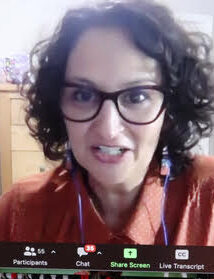 “We have a rise of evangelical megachurches in the borderlands that are now increasingly bringing in Mexican Americans and inculcating a type of white nationalist religiosity.
“We have a rise of evangelical megachurches in the borderlands that are now increasingly bringing in Mexican Americans and inculcating a type of white nationalist religiosity.
“We also have the oil and gas industry in which many Latinos are working in and making a living in. And border enforcement and policing, as we know, draws in many Latinx young men, Mexican-American men.”
Phillip Martin. a senior investigative reporter for The GBH News Center for Investigative Reporting at WGBH in Boston, agreed. “The buy-in to white supremacy as a pathway to whiteness is a salient feature of MAGA America.”
Neither journalists nor news consumers fully appreciate the degree that white supremacy has dominated the presence or absence of democracy in the United States, the panelists said.
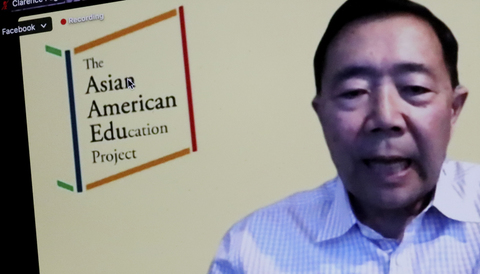 Kwoh (pictured) called the more than 11,000 hate incidents against Asian Americans over the last two years “a major test of democracy” and tied it to the lack of “a foundation around education. . . . There’s almost no teaching of Asian American history in the schools, and so we are trying to change that. We’re in about 10 states in the last year and a half,” Kwoh continued.
Kwoh (pictured) called the more than 11,000 hate incidents against Asian Americans over the last two years “a major test of democracy” and tied it to the lack of “a foundation around education. . . . There’s almost no teaching of Asian American history in the schools, and so we are trying to change that. We’re in about 10 states in the last year and a half,” Kwoh continued.
“I think that we have 53 lesson plans, and we’re adding 10 more, and we’re being asked to write anti-bias curriculum for the schools, and we’re also writing it for district attorney’s offices in New York and Los Angeles, because we feel, instead of sitting in jail for misdemeanor hate crime, you should learn about our history, and this is something that we feel very passionately about.”
How many know, for example, that Frederick Douglass spoke eloquently against the exclusion of Chinese in 1869, that the NAACP came to the defense of Japanese Americans who were interned in World War II, or that Filipino Americans and Mexican Americans united in the 1965 Delano, Calif., grape strike that “turned Cesar Chavez into an American saint,” in the words of columnist Emil Guillermo.
Chicago journalist Lillian Williams added, “Studies show that when children understand their history, they are more resilient and, in other words, they build interior traits that lead to success in whatever they do . . . “
So where does that leave journalists?
Muhammad urged more reporting on white supremacists. “It doesn’t take much to go on YouTube and actually see conference proceedings,” live or recorded, “of white supremacists and white nationalists gathering around the world to talk about this. I’ve watched one that took place in Ireland . . .
“The second thing that journalists can do . . . there should be so much more reporting on the dynamics of [Govs.] Ron DeSantis in Florida, as well as Greg Abbott in Texas. . . . How it is possible in the wake of Ron DeSantis’s concerted attacks on everything that democracy stands for . . . why people aren’t occupying the steps of the State House right now?
“In other words, the non-story to me is as important as the story itself, and it may simply be that if we reported on the risk/reward calculation for various organized groups in Florida, saying, we just don’t have enough people who are willing to go to jail under these new anti-protest laws, or these new laws that enhance penalties for disobeying an order from law enforcement, that is a story, because that is the seed and the germ of precisely as Margaret Atwood has so brilliantly imagined in ‘The Handmaid’s Tale,” a version of Gideon playing out right before us . . . . “
Rochelle Riley, a former columnist for the Detroit Free Press who now works for the city of Detroit, told of meeting a Republican state legislator recently who said, “look at how long it took us to literally say that Donald Trump was lying when he was lying. Look at how we are still tiptoeing around things that we know are true.
“At some point the language does have to change, and we have to get people to embrace that as a new mission, and maybe we can encourage more people to do it.”
Martin agreed. “There are some terms that years ago may have been hyperbolic that may in fact, be relevant at this point — [such as] the term fascism. . . . language is part of the challenge for journalists.”
Added John Watson, who teaches communication law and journalism ethics at American University, “Objectivity is actually the bias that is proper at the time. Objectivity is not the absence of bias, it is the proper bias.”
Rebecca Aguilar, president of the Society of Professional Journalists, looked at the crowd of veterans and suggested that each invite a person younger than 35, to which the moderator added, “When we invite you, please show up.”
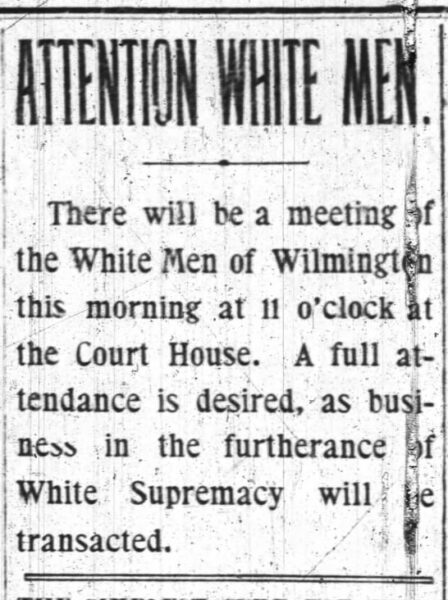
Gabrielle Gurley, deputy editor of the American Prospect, said she read “Wilmington’s Lie,” about the 1898 massacre by whites of Black leaders in Wilmington, N.C.
“A few years ago I had to review it, never had heard of this episode, had never heard of it.
“And I consider myself, you know, pretty fluent in American history.
“So now I hold this book up to my interns. ‘Read this book and Jan. 6 will not be that much of a surprise to you.’
“It’s happened before. . . . . The young people are not as well versed in these things.
“They need to understand these things so they can weave these stories into their journalism. . . . We need to guide them on the things that have happened in the past that are foreshadowing what we’re seeing today. . . . That is one thing that we can, as journalists, do.”
Funabiki, with longtime ties to San Francisco State, pushed back. “There are young journalists who want to do [social justice stories], but I think we need to work on the mainstream media to let them do it,” he said. Instead, they are writing for community and ethnic media or do podcasting or independent documentaries.
In addition, “One of the big buzz words right now is ‘news avoidance,’ and people just don’t want to turn to the news media,” Funabiki continued.
“Because either they don’t trust it or just simply because they think that the news is, or they find the news, too bleak. . . .
“We need to change journalism in a way that we’re giving or helping people in the community to solve their own problems, to be empowered, to find ways to deal with the issues that they’re most concerned about, because when they open up the newspaper, or they turn on the TV news, what they’re getting is not helpful. It’s news certainly, but it’s not helpful to them.
“It’s not relevant, it’s not useful. it’s not empowering.”
Don Hudson Named Newsday’s First Black Top Editor
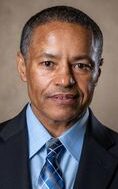 “Newsday announced Friday that managing editor Don Hudson has been named chief content officer and editor, succeeding Deborah Henley, who is retiring at the end of the year,” Maura McDermott reported Friday for the Long Island, N.Y., newspaper.
“Newsday announced Friday that managing editor Don Hudson has been named chief content officer and editor, succeeding Deborah Henley, who is retiring at the end of the year,” Maura McDermott reported Friday for the Long Island, N.Y., newspaper.
“He and Henley will work together as editors during a month-long transition starting Dec. 1.
“ ‘I’m thrilled that Don will lead Newsday into the future,’ Newsday’s publisher, Debby Krenek, said in a statement. ‘He has been a key leader in our Watchdog coverage of vital topics such as health, education, and transportation and growing Newsday’s audience across all of our platforms.’ . . .
“Hudson will be the first Black editor to lead Newsday. He earned his bachelor’s degree in radio/television management from the University of Louisiana at Monroe. He has worked as a reporter and editor at publications including the Orlando Sentinel; Gannett Co. Inc., in Tennessee, Michigan and Mississippi, where he helped shape civil-rights coverage that was named a finalist for a Pulitzer Prize; and The Decatur Daily in Alabama. . .
“Hudson, 61, lives in Farmingdale with his wife Miriam, a former first-grade teacher. He is president of the New York chapter of the Tuskegee Airmen, a motorcycle club whose members do community service work. . . .
“Hudson, who joined the paper four years ago, said, ‘I just want to continue that tradition, just strong watchdog journalism, investigative work, excellent storytelling and community-based journalism…. We want to continue to grow our operation across all these various platforms, social media, digital, NewsdayTV, and certainly we want to keep our print edition strong and vibrant. We have an excellent team put together and an excellent group of journalists who take a great deal of pride in what they do on a daily basis.’
“Of his role as one of the first Black editors to lead a major newspaper in the United States, Hudson said, ‘I think it certainly will mean some things to journalists of color across the country, because there are very few of us in such leadership roles.’
“He added, ‘I try to mentor and help folks across the board, and to me, that’s the most important thing, just growing the next generation of journalists.’ ”
- Claude Solnik, Long Island Business News: Patrick Dolan becomes Newsday sole owner (Aug. 1, 2018)
(Page views: 386 at 4:28.a.m. Oct. 1)
‘[btnsx id=”5768″]
To subscribe at no cost, please send an email to journal-isms+subscribe@groups.io and say who you are.
Facebook users: “Like” “Richard Prince’s Journal-isms” on Facebook.
Follow Richard Prince on Twitter @princeeditor
Richard Prince’s Journal-isms originates from Washington. It began in print before most of us knew what the internet was, and it would like to be referred to as a “column.” Any views expressed in the column are those of the person or organization quoted and not those of any other entity. Send tips, comments and concerns to Richard Prince at journal-isms+owner@
View previous columns (after Feb. 13, 2016).
View previous columns (before Feb. 13, 2016)
- Diversity’s Greatest Hits, 2018 (Jan. 4, 2019)
- Book Notes: Is Taking a Knee Really All That? (Dec. 20, 2018)
- Book Notes: Challenging ’45’ and Proudly Telling the Story (Dec. 18, 2018)
- Book Notes: Get Down With the Legends! (Dec. 11, 2018)
- Journalist Richard Prince w/Joe Madison (Sirius XM, April 18, 2018) (podcast)
- Richard Prince (journalist) (Wikipedia entry)
- February 2018 Podcast: Richard “Dick” Prince on the need for newsroom diversity (Gabriel Greschler, Student Press Law Center, Feb. 26, 2018)
- Diversity’s Greatest Hits, 2017 — Where Will They Take Us in the Year Ahead?
- Book Notes: Best Sellers, Uncovered Treasures, Overlooked History (Dec. 19, 2017)
- An advocate for diversity in the media is still pressing for representation, (Courtland Milloy, Washington Post, Nov. 28, 2017)
- Morgan Global Journalism Review: Journal-isms Journeys On (Aug. 31, 2017)
- Diversity’s Greatest Hits, 2016
- Book Notes: 16 Writers Dish About ‘Chelle,’ the First Lady
- Book Notes: From Coretta to Barack, and in Search of the Godfather
- Journal-isms’ Richard Prince Wants Your Ideas (FishbowlDC, Feb. 26, 2016)
- “JOURNAL-ISMS” IS LATEST TO BEAR BRUNT OF INDUSTRY’S ECONOMIC WOES (Feb. 19, 2016)
- Richard Prince with Charlayne Hunter-Gault, “PBS NewsHour,” “What stagnant diversity means for America’s newsrooms” (Dec. 15, 2015)
- Book Notes: Journalists Follow Their Passions
- Book Notes: Journalists Who Rocked Their World
- Book Notes: Hands Up! Read This!
- Book Notes: New Cosby Bio Looks Like a Best-Seller
- Journo-diversity advocate turns attention to Ezra Klein project (Erik Wemple, Washington Post, March 5, 2014)
When you shop @AmazonSmile, Amazon will make a donation to Journal-Isms Inc. https://t.co/OFkE3Gu0eK
— Richard Prince (@princeeditor) March 16, 2018
![]()

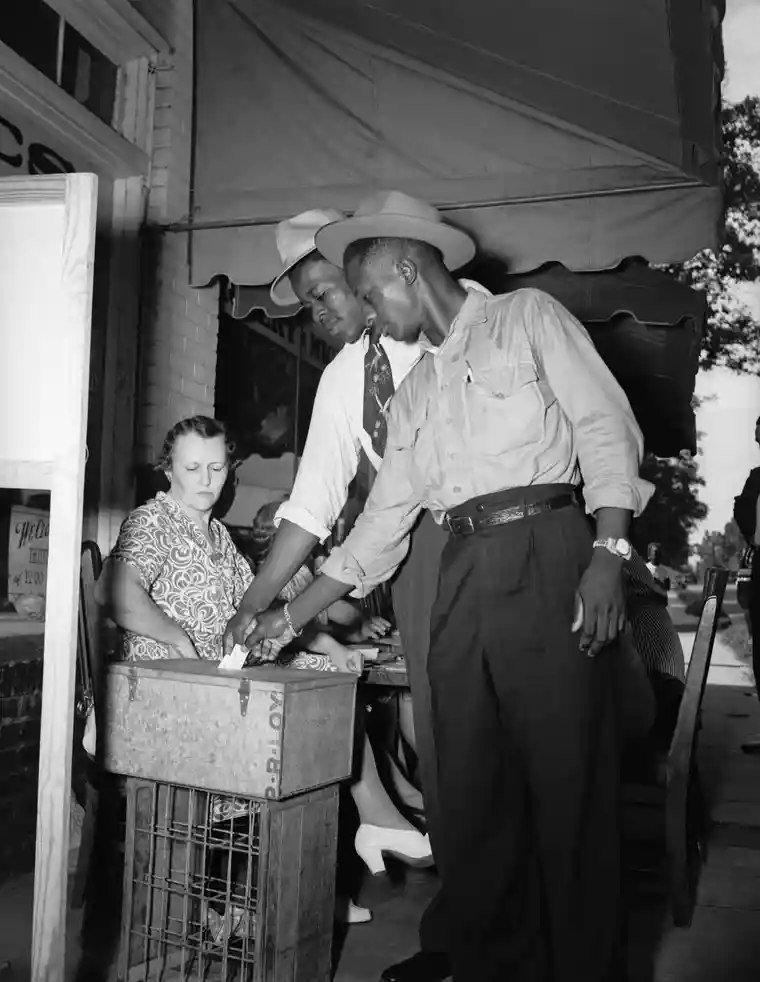
3 comments